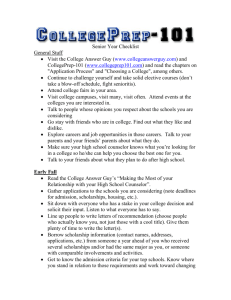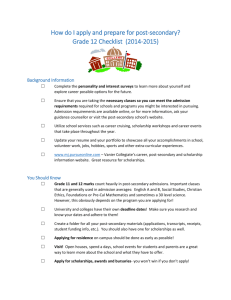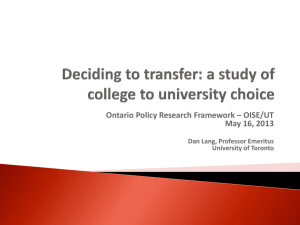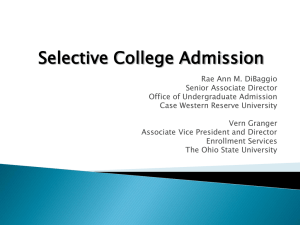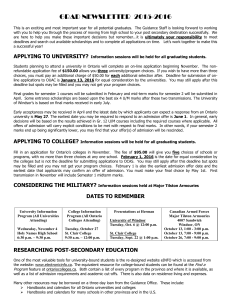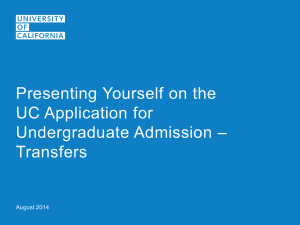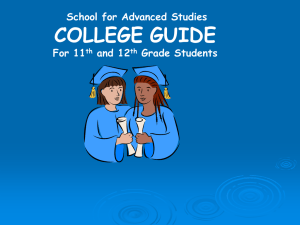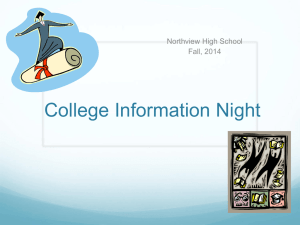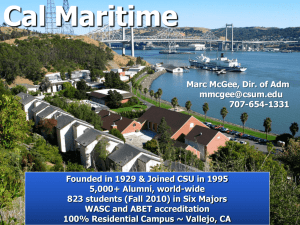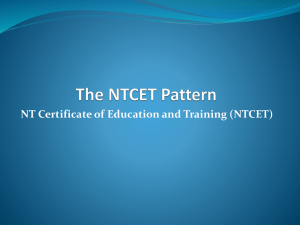University Advising - Collège Sturgeon Heights Collegiate
advertisement
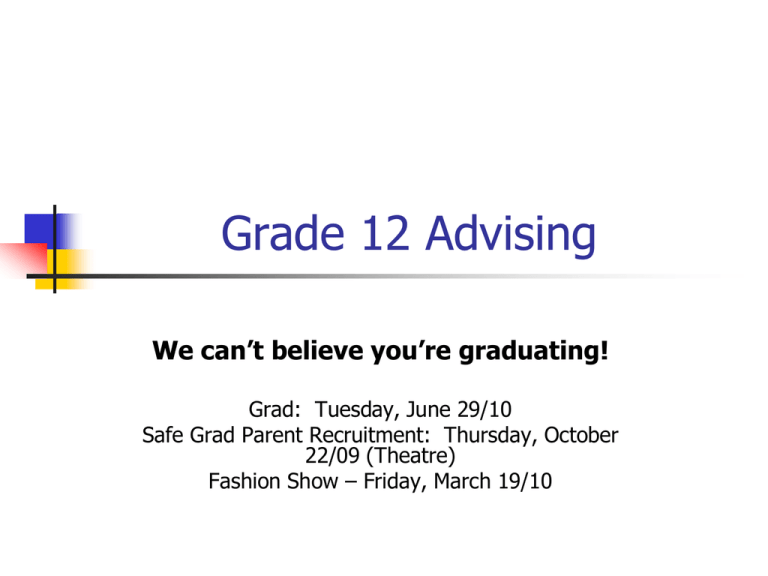
Grade 12 Advising We can’t believe you’re graduating! Grad: Tuesday, June 29/10 Safe Grad Parent Recruitment: Thursday, October 22/09 (Theatre) Fashion Show – Friday, March 19/10 Credit Checks Counsellors check every Grade 12 student Student has final responsibility Compulsory courses must be completed You need 30 credits to graduate FI students need 14 FI credits 40 Community Service Hours Credit Checks A – F – Mrs. Trenholm G – N – Ms. Yaholkoski O – Z – Mr. Gomes Postsecondary Programs and Opportunities Universities Public and private colleges Technical Institutes Apprenticeship Training Private vocational schools Cooperative Education Programs The Workplace Experience, travel and discover Differences between university and community college University is based on theory – for example, you may study the different theories of transmitting electricity and try to discover a better one. Community College courses are practical in nature – for example, you will learn how to manufacture an electrical wire, how to install it and how to repair it. Differences (continued) Universities see themselves as creators of new information. They are academic in nature and resemble a continuation of high school Community colleges are career oriented programs where you learn to apply the knowledge gained. Universities and colleges are offering more and more joint and co-op programs. Differences (continued) University tuition is $$$$/credit course 1 full year (30 credit hours) - $5000. + Tuition at Red River will vary depending on the program - $3,000. to $8,000. University – academic performance is a factor for admission to certain faculties Community college – everyone who meets the requirements is accepted. First come, first served. Wait list if program is full. General University Entrance Requirements at UM & UW 30 credits which satisfy Manitoba Education’s high school program 6 credits at the Grade 12 level (PE40F + 5) 3-40S courses off approved list One credit of English with 60% Average of 70% (UofM) & 65% (UofW) on top 3-40S courses including EN & MA UofW – no mark below 60% MA40SC & PY40S used for admission, not scholarships College Admission Requirements Generally – Manitoba Grade 12 high school diploma Admission requirements vary greatly between programs (Check handbook) First come, first served - Apply early May be waiting lists (1– 4 yrs) English, Math & Science are recommended Private Voc. Schools & Colleges Investigate, compare, visit schools & ask Registered by Manitoba Education & Training? Recognized diploma upon graduation? Admission test? Course outline? Attendance policy? Student services? Work experience? Co-op program? Cost of tuition, books, labs, etc. Jobs available upon graduation? Salary expectations? % employed in field of study? Job placement? Career Exploration Research Career Cruising Computer Program Attend an Open House Find a mentor, take a class, volunteer, work part-time, do some research Out of Province University Entrance Requirements University entrance requirements vary from university to university Use the internet to check entrance requirements University Fair (Canadian Universities) will be at Collège Sturgeon Heights on Thursday, November 5th (afternoon 1:30 – 3:30 pm) Important Deadlines December 1 – Advanced Early Admission Applications Based on Grade 11 marks (qualifies students for early acceptance and early admission scholarships) UofM – 92.5% UofW – 65% February 19 – U of M Early Admission deadline March 1 – U of W Early Admission deadline (must meet these deadlines to be considered for a scholarship) University of Winnipeg Entrance Scholarships Based on best 5 Grade 12 credits from Approved List of courses (See p. 36 of handbook) $4000.00 – highest average applying 95% or higher 2,250.00 90 – 94% 1,750.00 86– 89.9% 1,100.00 80 –85.9% 800.00 U of M – tiering starts at 85% average Please refer to p. 59 in U of M handbook Scholarship Preparation Marks – Different mark requirements for each scholarship Community Service –Have you volunteered your time in the community? Extra-Curricular – What activities are you involved in (sports, drama, music)? Cultural Connections – Special scholarships exist for Italian, Philipino, Polish, Aboriginal, etc. Specific Careers – scholarships are available for engineering, teaching, chartered accountants, etc. Work Place – some work places have scholarships available. Check with your parents for their place of employment. (Wendy’s, Tim Hortons, Credit Union, Canadian Legion, etc.) Preparation is the Key! Strong Transcript of Marks – Keep your grades up and take a challenging curriculum. Build a Team – Admission process is not something you can do on your own – parents, teachers, counsellors, friends and relatives can help you. Make a List – Note your interests and determine what you are looking for in a post-secondary institution. Visit – Go and visit the different institutions – Open Houses for U. of M., U. of W. and Red River are in February. Talk to delegates at the University Fair. Get Organized – Pay attention to important dates, application requirements and deadlines. Who will write your reference letters? Give them time to prepare. Start your essays early. Your Future depends on you! It is up to you to explore career choices that suit you. Choose a post-secondary institution that is the right fit for you. Research what is available in scholarships and if you are eligible to apply. It’s time consuming, but well worth your effort! University/College? Are you motivated? Are you ready to commit? There are other options – Travel, workstudy programs, taking a year off to work, colleges, technical trades, armed forces, apprenticeship programs, to name a few. Grade 12 Post-Secondary in Sturgeon Heights – Theatre University of Manitoba – Oct. 5 @ 9:40 University of Winnipeg – Oct. 9 @ 9:40 Red River College – Oct. 16 @ 9:40 Please sign up in Guidance Office Presentations in Theatre
